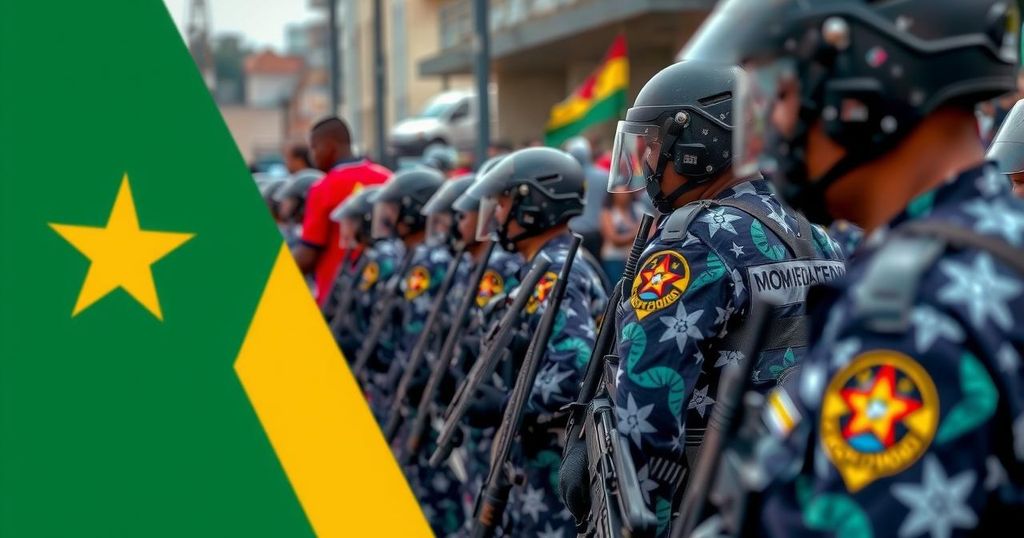World news
AFRICA, ANTONIO, ANTONIO JUAQIM, BBC, COMMISSION, DANIEL CHAPO, DEMOCRACY, ELECTIONS, FR, FRELIMO, MANUEL SAMUEL, MAPUTO, MON, MONDLANE, MOZAMBIQUE, OPPOSITION, PROTESTS, RENAMO, SAMUEL, SAO FRANCISCO XAVIER, SÃO FRANCISCO XAVIER CEMETERY, VE, VENÂNCIO MONDLANE, VIOLENCE
Marisol Gonzalez
0 Comments
Mozambique Election Crisis: Protests Turn Deadly Amid Claims of Police Violence
The ongoing protests in Mozambique following the recent presidential election have led to the tragic deaths of numerous individuals, including children. The protests, initially sparked by allegations of electoral fraud, have grown into a broader movement against Frelimo’s long-standing rule. CCTV footage revealed police used lethal force against unarmed protesters, raising significant concerns about human rights violations in the country.
In response to the recent presidential election results in Mozambique, protests have erupted, leading to tragic outcomes. Demonstrations against Frelimo’s continued rule—a party in power for nearly five decades—culminated in the death of a 16-year-old boy, Antonio Juaqim, who was shot while participating in a protest in Maputo. His uncle recounted that CCTV footage revealed police shooting at unarmed protesters, an act representative of the growing unrest and vehement opposition to the electoral process.
Frelimo’s candidate, Daniel Chapo, was declared the winner of the election with 71% of the vote, while his closest rival, Venâncio Mondlane, received 20%—a result Mondlane and his supporters claim was rigged. Following the election, protests intensified, marked by nightly pot-banging demonstrations in solidarity with Mondlane’s calls for resistance. Many citizens have resorted to protesting from their homes; nevertheless, violence ensued, resulting in the deaths of at least 40 individuals, including children.
At Antonio’s funeral, mourners—including many young friends—grieved the loss of a life cut tragically short, symbolizing the loss of hope among Mozambique’s youth. Furthermore, concerns regarding the police’s response to protests have been raised, with claims from officials attributing blame to protesters for violence against police forces. In contrast, opposition leaders argue the excessive force used by police exacerbates the situation. Ultimately, this election-related crisis exemplifies a significant turning point in Mozambique, with increasing dissent against the ruling party and a call for justice among the youth.
The current political climate in Mozambique has been marked by allegations of electoral malpractice and subsequent civil unrest. Frelimo, the ruling party, has faced growing opposition as dissatisfaction with its governance mounts, particularly among younger citizens striving for economic opportunities. The recent presidential polling has ignited a movement spearheaded by Mondlane, pushing citizens to voice their discontent. The situation escalated further when protests turned lethal, highlighting the tense relationship between the government and its citizens. This crisis not only represents a political struggle but also issues pertaining to human rights and governance in Mozambique as the nation confronts its future amid rising dissent.
The situation following the recent presidential election in Mozambique underscores significant challenges facing the political landscape. With increasing protests resulting in tragic fatalities, particularly among the youth, the public’s demand for accountability and change is louder than ever. As citizens seek to assert their rights and challenge the status quo, the actions of the ruling party, police, and opposition leaders will play a crucial role in determining the future of Mozambique’s democracy and its commitment to human rights.
Original Source: www.bbc.com




Post Comment